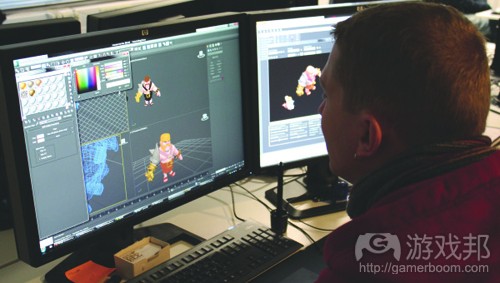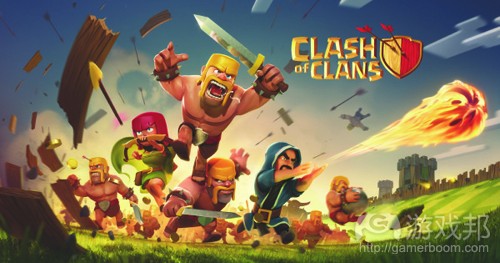Supercell:芬兰小团队崛起的行业神话
作者:Craig Chapple
Supercell工作室首席执行官Ilkka Paanane在此讲述了《Clash of Clans》开发商如何在抛弃第一款游戏之后的15个月中崛起成为全球移动神话。
Ilkka Paanane在成立这家芬兰工作室的三年之后表示,“我们的梦想是成为全球性的游戏公司。”
严格来看这还只是一家初创公司,但从它在《Clash of Clans》和《Hay Day》的巨大成功来看,Supercell已经迅速成长为世界上最大的游戏工作室之一。这两款游戏频频在App Store榜单登顶,日常收益一度飙升至240万美元。据App Annie数据显示,在去年11月份,该工作室这两款游戏的收益就超过了其他任何iOS开发商(其中包括拥有969款作品的EA)。
它的成功并不仅局限于欧洲市场,瞥一眼App Store就可知它的两款游戏已经在全球遍地开花,长期稳居美国、加拿大和日本热门榜单前列。
这种现象很快引起日本电信巨头软银以及游戏公司GungHo Entertainment的注意,GungHo的日本热门游戏《Puzzle & Dragons》是少数几款堪与Supercell的成功之作比肩的游戏之一,据称其日常收益约490万美元。
在Supercell和GungHo完成密切的交叉推广合作之后,GungHo及其母公司软银出手15亿美元收购了Supecell公司51%的股份。
现在这家成立三年的公司身价已达30亿美元。
Paananen在采访中表示,“我想最令我们兴奋的机遇就是真正成为全球性游戏公司的梦想。也就是我们想让全球的游戏玩家来体验相同的游戏作品。我们还处于早期发展阶段,但《Clash of Clans》已经显示出它有可能成为这类作品的潜力。它已经是美国、欧洲排名第一的iOS游戏,在中国也位居第二,在日本进入前三名。”
他补充表示:“如果你想创造历史,那就需要时间和耐心。现在我们显然做得很好,公司的财务状态也十分稳定,那么你就需要全力以赴来实现这一目标。”
小小的开端
这家工作室一开始并没有立志成为全球性的大公司,也并没有很悠久的发展史。Paananen坦承在2010年成立公司时,工作室仅有6名创始人,他们当时可没想到自己的作品能够在用户之间引起如此大的反响。
“当然,我们一直富有雄心壮志,但还真不敢有这种梦想。”
这名企业家型的CEO过去也有自创公司的背景,在2000年成立了针对功能性手机开发游戏的Sumea工作室。之后他在2004年将公司出售给Digital Chocolate,并担任后者欧洲总经理,后来又担任总裁,直到2010年初离职他又创办了自己的工作室Supercell。
最初的计划并非移动平台,而是针对浏览器、Facebook、移动和平板电脑设备创造跨平台游戏。
其首个作品是即时Facebook MMO游戏《Gunshine》,并且移植到了手机平台,支持跨平台运行。
但经过14至15个月的开发,该工作室最终还是放弃了这款游戏,尽管它当时已经吸引了50万月独立用户。这可能是一个艰难的决定——但Paananen表示团队自此以后再也没走过回头路。
《Gunshine》并非这个决策唯一的炮灰。Paananen称在2011年秋季公司“实际上比否决了我们正在开发的一切项目”,并将唯一的重心转向平板电脑和移动平台。
“我们认识到得从头开始针对移动平台开发游戏。平板电脑和智能手机上的UI与桌面电脑的鼠标UI截然不同。我们意识到如果你想为移动平台创造最佳游戏体验,那就不能将这些拼凑在一起。”
“所以我们决定,专注于平板电脑和移动平台,这可能是我们至今制定的最佳决策。”
庆祝失败
取消项目之后,该工作室快速投入5款新游戏,其中一些在加拿大发布进行beta测试。鉴于较高的质量标准,广泛使用性能指标和参数之后发现,并没有几款游戏能够达标。
但Supercell却并不会因为失败而失望。事实上,该工作室还会开香槟庆祝任何游戏项目被取消。
Paananen称公司文化就是保持透明,不会向成员隐瞒游戏项目被取消的原因。
“所以我们会向公司每个人公开每款游戏的关键性能指标和参数。公司每个人都可以在日常邮件中同时获得这些信息。”
“人人都可以看到实情,以及该游戏的情况,我想大家也都认识到《Gunshine》不会有前途,我们需要做点不同的内容这一情况。”
“当然,抛弃大家如此辛苦完成的项目总是很让人伤心的。但另一方面,我认为大家也知道我们别无选择,我几乎可以说有些人可能已经从中解脱并认为,我们终于可以试试不同的东西。”
Supercell立足的另一个关键支柱就是创造游戏的人才。
Paananen强调了公司员工的重要性,这一点与Valve公司表示引进最佳人才的重要性颇为相似。
他承认许多公司都重视人才,但对Supercell来说,员工一直是公司的第一位,其重要性甚至超过财政目标、收益和利润。其理念是创造一个富有创意和吸引人上人的乐土,从而推动公司创造更多收益和更棒的游戏。
他解释称,“我们在招聘时有极高的标准。在我们Supercell有相对庞大的联合创始人团队,我们6人成立了公司。因为大家都是这一行中资历很高、富有经验的人士,这就有助于我们吸引下一轮人才,因为精英总是希望与最棒的人共事。”
“Supercell背后的理念就是你可以得到最棒的人才,但不要干预他们的创意自由。Supercell是由我们称之为‘细胞’的小型团队组成。这些‘细胞’很小,但也非常独立。”
这种细胞结构就是Supercell这家公司名称的由来。每个团队少则5、6人,Paananen称这种结构意味着人人都有机会参与游戏开发,这为每位开发者注入了一种归属感和激情。
他补充表示,与大型公司不同的是,Supercell并不采用审核流程以及“委员会设计”的游戏开发方式,他认为这是许多杰出开发者讨厌在大公司就职的原因。该工作室赋予团队自主开发游戏的创意自由。
“对于合适的人来说,这是一种非常有趣的环境。团队很小,但人人都肩负重任。我认为这比在大型公司中更有压力,也更为有趣。”
下一个任天堂
在这种创意过程以及严格的人才招聘要求的引导下,《Clash of Clans》和《Hay Day》会成为全球热作也在情理之中。
Paananen称工作室现在制定的是长期计划,并不需要强推新游戏来支撑局面,而要耐心等待能够达到其标准的游戏问世。Paananen所谓的成为全球性游戏公司的梦想并非无心之谈,事实上,他已经打算效仿行业中最具标志性的公司。
“我们想创建真正杰出的公司,也就是让人们在10年、20年甚至30年后回顾时仍会说Supercell真是太棒了的公司。”
“这就好像人们对任天堂的感觉。任天堂无论做什么,都会受到玩家欢迎,它的名字家喻户晓。所以如果我们想让Supercell上升到同样的境界,就需要耐心,现在看起来我们似乎有了这种条件,因为我们有资源,当然也有时间和耐心。”
如果说《Clash of Clans》以及《Hay Day》的成功并不足以推动Supercell上升至这一高度,软银和GungHo的15亿美元应该能够助其实现这些计划。
Paananen表示,本次出资占80%的软银并不像一般的VC投资者,因为这家电信巨头并不需要通过出售股份回收资金。
他补充称与软银这种公司合作是Supercell的梦想,因为软银已经做好耐心等待的准备,也允许Supercell保持其独立性。
“除此之外,软银在亚洲市场拥有强大的影响力,尤其是在日本,但与韩国和中国也联系紧密。所以我们认为这可能是一个加快我们成为全球性游戏公司的途径。”
Paananen坚定表示这项交易不会影响到Supercell的运营方式,并坚称公司创始人所签订的协议意味着他们将保留公司所有的控制权。
长期计划
鉴于这种富有远见的计划,Supercell团队已经将目光投入到下一款热作的开发中,不过其CEO也表示继续运营《Hay Day》和《Clash of Clans》的重要性,向行业中的《魔兽世界》和《英雄联盟》等经久不衰的热作看齐。
“我们必须优化这些游戏。当然我们还需要向其他市场扩张,韩国是我们的未来目标之一,我们在日本还只是刚刚开始。我们觉得还有更多玩家尚无法体验这些游戏,所以还存在许多市场机遇。我们仍可通过引进新功能、内容和玩法,为玩家提供更好的体验。所以这是当前的第一要务。”
他补充称:“时机成熟了我们就会推出一款新游戏。”
那么,这名CEO最近几年有什么个人计划呢?
他自信地表示,“我的未来当然与Supercell有关。”即管创建了世界上最大的工作室之一,Paananen仍然志在实现更多目标,也相信可以通过Supercell实现这所有目标。从他已经收获的成功灵感,以及软银创始人孙正义对该公司负有300年的使命这一情况来看,Paananen和Supercell前途无限。
“我已经无法想象更好的局面了。我们有很棒的团队,这是一个不断发展的市场。但仍然是移动和平板市场的早期阶段,我觉得这可能就像PC游戏在90年代初的情况。所以,对我们公司以及整个市场来说,大家都还处于初始阶段。现在我很难想象自己没有Supercell的生活会怎么样。”(本文为游戏邦/gamerboom.com编译,拒绝任何不保留版权的转载,如需转载请联系:游戏邦)
Supercell: The billion dollar start-up
By Craig Chapple
Studio CEO Ilkka Paananen tells Develop how the Clash of Clans developer went from scrapping its first title after 15 months to global mobile sensation
“The dream is to become a global games company,” says an ambitious Ilkka Paananen, just three years after the formation of the Finnish studio.
It may technically just be a start-up, but this Helsinki developer has quickly become one of the biggest games studios in the world thanks to its huge success from mobile and tablet games Clash of Clans and Hay Day.
The two titles frequently top the App Store charts, at one point making the firm $2.4m a day. According to App Annie, during November last year the studio made more revenue from its two games than any other iOS developer, including EA and its 969 titles.
Its success isn’t just confined to Europe either, a quick look on the App Store will show both its two titles have become a worldwide sensation, topping the charts as far as the US, Australia and Japan.
This near-global reach didn’t go unnoticed, attracting the attention of telecomms giant Softbank and GungHo Entertainment, the latter of which develops Japanese mobile hit Puzzle & Dragons. This match-three title is one of the few games that has been able to meet the success of Supercell’s own, and was recently said to be making around $4.9m a day on average.
After a close partnership between Supercell and GungHo to cross-promote their titles, the publisher and its parent company Softbank splashed out $1.5bn to buy a 51 per cent stake in the Finnish outfit.
Three years after it was born, Supercell is now worth $3 billion.
“The opportunity that has us excited I guess is this dream to become a truly global games company,” Paananen tells Develop of the young studio’s lofty ambitions.
“Meaning that we would want to unite gamers all over the world to play the same game franchises. It’s still very early days for us but Clash of Clans is showing some signs that maybe it could be this type of franchise. It’s been number one in US, Europe, as high as number two in China and as high as number three in Japan.”
He adds: “If you want to create history, that takes time and patience. Now obviously that we’ve been doing so well and the financial position of the company is so stable, then you do have all the time in the world to get there.”
Small beginnings
The studio wasn’t always set on creating a global company and a long-standing heritage however. Paananen freely admits when the developer’s six founders originally set up back in 2010, they could not have envisaged striking such a chord with consumers.
“Of course we’ve always been ambitious and had big dreams, but still, this goes well beyond our dreams.”
Supercell’s entrepreneurial CEO has experience of setting up his own companies in the past, founding Sumea in 2000, which also worked on mobile games for feature phones.
The firm was later sold to Digital Chocolate in 2004, where Paananen stayed as MD of Europe and then president until early 2010. After leaving, he later opened up his own studio, Supercell.
The original plan was different from how it has made its name. It initially set out to create cross-platform titles for the browser, Facebook, mobile and tablet.
Its debut title was set to be a real-time Facebook MMO, called Gunshine, which it would also port to mobile, with the same world accessible from any device.
But after 14 to 15 months of development, the studio abandoned the title, despite attracting half a million unique monthly users. It may have been a tough decision – but one that Paananen says the team has not looked back from since.
Gunshine appears not to be the only casualty of that decision. Paananen says in Autumn 2011 the company “basically killed everything we were working on” and put its sole focus onto tablet and mobile.
“We realised that by definition you really need to build the game from the ground up for mobile,” he says. “The UI on the tablets and smartphones are so different from the mouse UI you have on desktop. We realised you can’t match those together if you want to create the best possible experience on mobile.
“So therefore we decided that, okay, let’s focus solely on tablet and mobile, and that’s probably the best decision we’ve ever made.”
Celebrating failure
Unperturbed by the cancellations, the studio quickly set out on five new games, a few of which even launched in beta in Canada. The high quality bar and extensive use of performance indicators and metrics however meant a few of those titles didn’t make it.
But Supercell has never been a company to greet failure with disappointment. In fact, the studio celebrates any game cancellation with a bottle of champagne.
And not keen to ever leave its staff in the dark on how its games are faring or why they have been canned, Paananen reveals a culture of transparency at the studio.
“So we distribute all the key performance indicators and metrics of every single game to everybody in the company. Every single person at the company gets them at the same time by these daily emails.
We decided to focus solely on tablet and mobile, and that’s probably the best decision we’ve ever made.
“Everybody can see what’s the truth and what the game looks like, and everybody I guess realised that okay this (Gunshine) isn’t really going anywhere and we need to do something different.
“Of course it always breaks your heart to throw something away that people have been working so hard on. But on the other hand I think people saw that, okay, there was no other way and I would almost say that some people probably were almost relieved and thought, okay let’s try out something a bit different.”
Another one of the key pillars Supercell is built upon is what makes the games happen – the people.
Through his chat with us, Paananen stresses the importance of the company’s employees, echoing similar sentiments to the likes of Steam giant Valve on just how vital it is for the studio to bring in the best staff it possibly can.
He admits many companies say this, but explains that, to Supercell, people will always be the number one priority, and are more important than financial goals, revenue and profit. Although the idea here is that creating a hotbed for creativity and attracting the best of the best will in turn generate bigger revenues and better games.
“We have a very high bar in recruiting,” he explains. “So first of all, at Supercell we had a relatively large group of co-founders, six of us who founded the company. And since all of those guys are quite senior and experienced in the local scene, that great group of people then helped us attract the next round, because they want to work with the best.
“So the idea behind Supercell is that you can get the best people but then just to stay out of there way and give them the creative freedom. Supercell is organised into small teams that we call cells. The idea is that these cells are small, but also very independent.”
It’s this cell structure that is the inspiration for the company’s name, Supercell. Each team can be as small as five or six people, and Paananen says such a structure means everyone gets a chance to work on the game experience itself, which instills a sense of ownership and passion in each developer.
He adds that unlike larger firms, Supercell has done away with greenlight processes and doesn’t use a ‘designed by committee’ style to games development that he says most talented devs hate at the big companies. Instead, the studio looks to give teams the creative freedom to make the titles they want.
“For the right kind of people it’s a really fun environment. Teams are small, everybody has a large responsibility. That creates a lot more pressure I guess than you would have in a bigger organisation and it’s a lot more fun.”
The next Nintendo
Lending itself to such a creative process and hiring in the strongest possible candidates, it’s no surprise Clash of Clans and Hay Day have become huge hits across the globe.
But such is their success, Paananen says the studio can now plan for the long-term, and does not have to force new games to keep itself afloat, but instead wait for the right title that meets its particular and lofty standards.
When Paananen says his dream is to become a global games company to stand the test of time, he isn’t taking it lightly. In fact, he has already set his sights on emulating one of the industry’s most iconic companies.
“We want to build something truly great, something that people, in ten, 20, 30 years would look back and say that Supercell really did something great,” states Paananen.
“Much like, for example, the way people feel about a company like Nintendo. A company that the players absolutely love for everything they do and everybody recognises the name. So if we want to build Supercell to the same space, the fact is it’s going to take many, many years, tens of years. It takes time and it takes patience and it feels like we now have a good shot at building that kind of company because we have the resources, and we definitely have the time and patience.”
If the success of Clash of Clans and Hay Day wasn’t enough to propel Supercell to such heights, Softbank’s and GungHo’s $1.5bn purchase of a majority holding in the company should help it achieve these plans.
We want to build something truly great, something that people, in ten, 20, 30 years would look back and say that Supercell really did something great.
Paananen says Softbank, which made up 80 per cent of the purchasing fee, isn’t like a typical investor, such as a VC, as the telecoms giant does not need to sell the shares down the line to make its money back.
He adds that partnering with a firm like Softbank is a dream come true, as it is prepared to be patient and plan for the long-term, and also allows Supercell to keep its independence.
“On top of that of course, Softbank has a very strong presence in the mid-eastern markets, especially in Japan, but also connections to Korea and China and so on,” he says. “So we thought that would be a way to accelerate ourselves towards being a truly global games company.”
Paananen is adamant that the deal will not affect how Supercell operates, and insists the agreement the Finnish studio’s founders signed means they will retain complete control of the business.
Playing for the long-term
With its future set and ambitious plans in motion, the team at Supercell has set its eyes on developing the next hit, although its CEO says it is just as important the studio continues working on Hay Day and Clash of Clans for the foreseeable future, similar to the longevity seen in the industry’s biggest games like World of Warcraft and League of Legends.
“We need to make these games better. And then of course we are looking at expanding to other markets, so Korea is one of the next ones on our list and we have just got started in Japan, where we now have Clash also available on Android. We feel like there are so many more players who haven’t played these games yet, so there’s an opportunity there.
“We can still make these games so much better for our players by introducing new features, content and ways to play, and so on. So that’s very much a first priority.
He adds: “At some point a new game will come out from us.”
As for his own future, what awaits the CEO of one of the industry’s biggest success stories in recent years?
“My future is absolutely with Supercell,” he states assuredly. Having built one of the biggest studios in the world, Paananen still aims to achieve more, and belives he can do all of that at the house that built Clash of Clans.
Drawing inspiration from the success he’s already had, and from that of Softbank founder Masayoshi Son, whom he says has a 300-year mission for his company, the sky is the limit for both Paananen and Supercell.
“I couldn’t imagine any better. It’s such a fantastic group of people. And you know, it’s a growing market. It’s still very early days for the mobile and tablet market by the way, I feel it’s perhaps like the PC gaming market of the early ‘90s or something like that. So it’s very, very early days, both for us as a company and the whole market in general.
“It’s extremely difficult to imagine life without Supercell at the moment.”(source:develop-online)
下一篇:游戏设计师必须尽量多玩游戏吗?











































 闽公网安备35020302001549号
闽公网安备35020302001549号